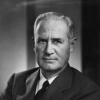Arthur Hays Sulzberger

Arthur Hays Sulzberger
Arthur Hays Sulzbergerwas the publisher of The New York Times from 1935 to 1961. During that time, daily circulation rose from 465,000 to 713,000 and Sunday circulation from 745,000 to 1.4 million; the staff more than doubled, reaching 5,200; advertising linage grew from 19 million to 62 million column inches per year; and gross income increased almost sevenfold, reaching 117 million dollars...
NationalityAmerican
ProfessionPublisher
Date of Birth12 September 1891
CountryUnited States of America
For if the Germans do not help defend the West, American and Canadian troops must cross the seas to do the job, and I venture to believe that the troops - if not the statesmen - regard this as an interference at least in their own domestic affairs.
Between 1939 and 1945 you produced weapons and war equipment valued at thirteen billion dollars, 70 per cent of which you shipped to your allies. The same process is going on today in Canada's much larger and growing industry.
We tell the public which way the cat is jumping. The public will take care of the cat.
We journalists tell the public which way the cat is jumping. The public will take care of the cat.
I look askance at any movement which assists in making the peacemaker among nations merely a national warrior.
Obviously, a man's judgement cannot be better than the information on which he bases it
The United States can tell you all about what's wrong with the British, to say nothing of the Russians.
I am a non Zionist because the Jew, in seeking a homeland of his own, seems to me to be giving up something of infinitely greater value of the world. ... I look askance at any movement which assists in making the peacemaker among nations merely a national warrior.
Speakers are not supposed to waste time on platitudes, but the capacity of this generation for ignoring the obvious and concentrating on the negative and the obscure is immense.
The statesmen still say that we should not interfere in the internal affairs of other nations and yet it is not possible any longer not to interfere, even when we do not mean to do so.
What Ottawa and Washington used to think about Turkey or Iran was not very important because we really didn't think much about either, but now what we think about them is extremely important - to ourselves and to many other peoples.
We [journalists] tell the public which way the cat is jumping. The public will take care of the cat.
News is so often a report of conflict, an account of problems, a thing of the day and even of the minute, that sometimes I think we make the background darker and the shadows deeper than they actually are.
Freedom of the press, or, to be more precise, the benefit of freedom of the press, belongs to everyone – to the citizen as well as the publisher… The crux is not the publisher’s ‘freedom to print’; it is, rather, the citizen’s ‘right to know.’